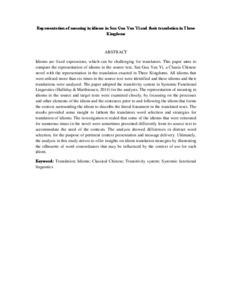Citation
Yap, Ngee Thai and Khoo, Yen Loo
(2018)
Representation of meaning in idioms in San Gua Yan Yi and their translation in Three Kingdoms.
Journal of Language and Communication, 5 (2).
pp. 263-281.
ISSN 2289-649X
Abstract
Idioms are fixed expressions, which can be challenging for translators. This paper aims to compare the representation of idioms in the source text, San Gua Yan Yi, a Classic Chinese novel with the representation in the translation enacted in Three Kingdoms. All idioms that were utilized more than six times in the source text were identified and these idioms and their translations were analyzed. The paper adopted the transitivity system in Systemic Functional Linguistics (Halliday & Matthiessen, 2014) for the analysis. The representation of meaning in idioms in the source and target texts were examined closely, by focussing on the processes and other elements of the idiom and the sentences prior to and following the idiom that forms the context surrounding the idiom to describe the literal lineament in the translated texts. The results provided some insight to fathom the translators word selection and strategies for translation of idioms. The investigation revealed that some of the idioms that were reiterated for numerous times in the novel were sometimes presented differently from its source text to accommodate the need of the contexts. The analysis showed differences in distinct word selection, for the purpose of pertinent context presentation and message delivery. Ultimately, the analysis in this study strives to offer insights on idiom translation strategies by illustrating the silhouette of word concordances that may be influenced by the context of use for each idiom.
Download File
![[img]](http://psasir.upm.edu.my/66217/1.hassmallThumbnailVersion/Representation%20of%20meaning%20in%20idioms%20in%20San%20Gua%20Yan%20Yi%20and%20their%20translation%20in%20Three%20Kingdoms.pdf)  Preview |
|
Text (Abstract)
Representation of meaning in idioms in San Gua Yan Yi and their translation in Three Kingdoms.pdf
Download (36kB)
| Preview
|
|
Additional Metadata
Actions (login required)
 |
View Item |

